Last updated on December 7th, 2020 at 03:34 pm
Bristol Farms was founded in November 1982 by two men whose careers had been in the meat business. Irv Gronsky and Mike Burbank were moving toward retirement age and so decided to sell their high-end meat business that supplied restaurants and butcher shops. But they weren’t quite ready to stop working altogether, so they decided to try their hand at retail, believing that if they sold fresh, high-quality meat, merchandised like one would find in a butcher shop, they could build a customer base.
So the duo opened Bristol Farms in a space once occupied by a chain store in Rolling Hills, California.
As one might imagine, meat was the centerpiece of that first store, complemented by produce, according to Steve Howard, VP of perishables, who has been with company 29 of its 35 years. Eventually, the store added a full complement of grocery departments, plus an adjacent café.
The meat department was “full-service, everything behind glass, nothing overwrapped like the industry traditionally stocked,” Howard said. “We had a commissary in the back so the food was made fresh and brought right out to the case daily. I think (Gronsky and Burbank) were ahead of their time.”
To this day, Bristol Farms does not sell meat that is overwrapped, he added.
Bristol Farms also was ahead of its time in offering sushi in its stores. Gronsky frequented a sushi restaurant and knew he wanted to make it available at Bristol Farms. He began a personal campaign to get the restaurant’s sushi chef, a Japanese émigré named Yoshi Kubo, to come to Bristol Farms. Eventually, he was successful. Kubo started the program and over the years trained many other sushi chefs to prepare different kinds of sushi. One of his trainees was Craig Tsuchiyama, who has “taken Yoshi’s program to the next level with poke” at Bristol Farms stores today, Howard says.
Also early on, Bristol Farms operated restaurants inside stores—sit-down full-service restaurants that focused on breakfast and lunch, he said. And there was a need for them, he added. “The Manhattan Beach store at that time (1991) had one of the only restaurants around for those businesses to visit at lunchtime.”
On weekends, many shoppers would visit the restaurant for breakfast as a prelude to their weekly grocery shop at Manhattan Beach.
Because of the highly interactive service departments, Bristol Farms has operated since the beginning; hiring the right people also has been important from the beginning.
“The Gronsky family built the foundation for the company on service and the quality of people they hired,” Howard says. “They wanted people that liked food, liked customers; having everything be a service-oriented market forced interaction with our customers. The customers got to know the employees so it created this family shop vs. a chore that shopping is at times. The Gronskys were some of the early creators of food as theater, food as Disneyland environment, food as a fun place to visit and shop. They were big proponents of sampling, free coffee samples, cheese samples, offering the first slice of the deli meats behind the counter to the customer to make sure the thickness was right.
“They created that fun environment for customers to participate in the experience; that’s still happening today at Bristol Farms, and I think has been copied by a lot of our competitors,” he said.
Steady growth
That one store in Rolling Hills has bloomed over the past 35 years into 12 Bristol Farms stores—soon to be 13—plus three Lazy Acres stores.
The 17,800-s.f. store in Rolling Hills was followed four years later by a larger store in South Pasadena (22,500 s.f.). Irv Gronsky’s son David ran the South Pasadena store, which offered a selection of housewares shoppers’ convenience. It sold high-end lines like La Creuset.
The Manhattan Beach store, at 33,900 s.f., opened in 1991 with a catering facility and cooking school.
In 1996, Gronsky and Burbank sold the three Bristol Farms stores to Kidd/Kamm, an investment firm, when they were ready to really retire.
In summer 1998, Bristol Farms entered the dynamic Orange County market in Newport Beach. In June 1999, Bristol Farms purchased a small store that was a Hollywood landmark, Chalet Gourmet. Soon after, a store in Westwood opened.
In November 2000, Bristol Farms opened a store at the site of the former Chasen’s restaurant, a hallowed place in the lore of “Old Hollywood.” Bristol Farms preserved many of the restaurant’s elements in the store.
In fact, Bristol Farms make sure to give each store a distinct look and feel based on the community it operates in.
The year 2006 brought another 40 percent growth in size and sales for Bristol Farms with the openings of locations in Westchester, La Jolla and Palm Desert.
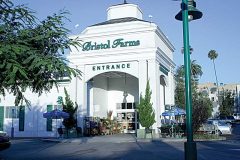 In August 2013, the Santa Monica store on Wilshire Boulevard opened in a former Albertsons space.
In August 2013, the Santa Monica store on Wilshire Boulevard opened in a former Albertsons space.
While the Santa Monica location is about the same size as Bristol’s other stores—30,000 s.f.—it carries about 5,000 more items because back room space was decreased.
The store features a “Starbucks Coffee shop, juice bar, smokehouse, wok station, sushi bar, a cheese cave—everything you would expect from Bristol,” said Kevin Davis, who was president and CEO at the time. Today, Davis is chairman and CEO, following the promotion in March 2015 of Adam Caldecott to president and COO. Caldecott, now president and co-CEO, had been EVP of retail prior to his promotion.
The Santa Monica store’s “food court,” as Davis described it, was the company’s largest at the time. Its features include a salad bar, hot food bar, nine-kettle hot soup island, chili bar, panini bar and carving station.
“We think this store offers the most ready-to-eat, prepared and grab-and-go hot food of any store we have, in addition to the biggest grocery selection in the middle of the store you’ve ever seen,” Davis said.
Bristol Farms has collected a long string of accolades since the first store opened. The Carson-based gourmet and specialty food retailer has received awards from local media for “Best Small Market” with the best deli, sushi, meat and cooking school. Zagat’s Marketplace Survey also has rated Bristol Farms as the No. 1 market in overall quality and service; stores were described as “a shopper’s beautiful dream with wide aisles, helpful staff and beautiful presentations.”
On Nov. 11, the company opened a new prototype store on Mulholland Drive in Woodland Hills.
Howard says, “At 35 years, Bristol Farms is a company that has withstood the test of time. We’ve seen competitors come and go, but we have consistent and true to our quality, our service, our offerings. I think Irv Gronsky and Mike Burbank should be proud of what they started in November of ’82 to where we are, coming up on November of 2017.”
Story continues below
Keep reading:
Letting The Food Speak For Itself: Bristol Farms’ New-Concept Mulholland Store
Davis Lives Life to Its Fullest, Wherever He Is, Whatever He’s Doing
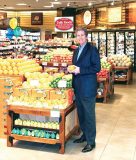
Kevin Davis could be described as The Most Interesting Man in the Grocery Business.
His career has spanned 45 years already although he’s only 64; he has been married for nearly 36 years to his wife, Cindy, and they have seven kids; he snow-skis, fishes, golfs and goes on bike rides that are 100 miles long or more; he gives back to a number of charities, community organizations and industry organizations (he’s chairman of the Food Marketing Institute until early next year, for example); and he is chairman and CEO of an upscale grocer that competes in the incredibly competitive Southern California marketplace. How he has time to be a successful husband, father (and grandfather), athlete, philanthropist and grocery executive is a question for the ages.
For those reasons and more, The Shelby Report proudly inducts Kevin Davis into the Food Industry Hall of Fame.
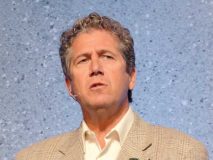 Food Industry Hall of Fame inductee Kevin Davis is chairman and CEO of Bristol Farms and chairman of Lazy Acres, two preeminent specialty and natural food store banners in Southern California celebrating 35 years in business.
Food Industry Hall of Fame inductee Kevin Davis is chairman and CEO of Bristol Farms and chairman of Lazy Acres, two preeminent specialty and natural food store banners in Southern California celebrating 35 years in business.
The company had three stores when Davis took the helm in 1996; the 12th Bristol Farms will open Nov. 11. That’s not counting three stores under the Lazy Acres banner, which Bristol Farms acquired in 2005. (Bristol Farms, Lazy Acres and Metropolitan Markets in Seattle are sister companies under the Good Food Holdings umbrella, a holding company whose majority shareholder is Endeavour Capital.)
Davis has been with Bristol Farms for more than 21 years now, joining the company in April 1996 after spending about 22 years with Ralphs. He took his first job in the grocery industry as a young teen as a box boy at Shopping Bag in Pasadena.
“I got the job, perhaps in part by showing up in a white short-sleeved shirt and black bow tie ready to work the day I applied,” says Davis, who was not yet 16 at the time. “I enjoyed the quick pace and action of the front-end at the grocery store, and ran around the place working and getting carts like it was basketball practice, never stopping all day.”
Within just a few weeks, he was promoted to assistant retail clerk and started learning how to stock the shelves. Soon after, he went to cashier school.
“Whenever I wasn’t in class, I would work,” he says. “Whenever anyone called in sick, I would come in and work. When they needed a stock clerk in the summer months to work from midnight to 9 a.m., I was happy to come in. I worked so many hours that by the time I was 17 years old, I was already a journeyman retail clerk. Thanks to the good pay and available hours, I was able to buy my first car—a 1967 red Mustang—while I was still 16 years old.”
After graduating from Pasadena High School, he was accepted to UCLA and wanted to study political science and eventually go to law school. The Shopping Bag store had been sold, so he applied for a job at the Ralphs on Sunset Boulevard in Hollywood, not far from UCLA.
There was a history of working at Ralphs in his family: his younger brother, Kelly, had worked at a Ralphs in Pasadena (where, incidentally, a young Jim Lee, who later worked for Stater Bros. and now the USC FIM Program, was the night manager) and his mother, Beverly, had become an executive secretary for the CFO at Ralphs’ headquarters.
In 1974, Davis went to work at the “Rock-n-Roll Ralphs” on Sunset Boulevard, he says. “It was the first 24-hour store I ever worked at, and it was a crazy, busy and wild place to work. Everybody from movie stars and famous celebrities to street people and ‘working girls’ packed that store at all hours of the day and night. It was a firsthand learning experience where I literally got the opportunity to do everything you can do in a grocery store.”
At the time, CEO Byron Allumbaugh and President Pat Collins had Ralphs in rapid expansion mode and needed prospective management candidates. They surveyed current employees to see who was attending college and might be interested in moving up the ranks. Davis was encouraged to transfer to USC to get into the Food Industry Management (FIM) Program. He did so, got his FIM certificate and continued his education to get his bachelor’s degree. In the meantime, he had started working at Ralphs in Huntington Beach, where his parents had moved while he was in college. It was there that he met his future wife, Cindy; she was 16. They would marry four years later, when she was 20 and he was 28.
The climb begins
After graduating from USC, he became assistant store manager at the Sunset Boulevard Ralphs; his first store manager job was at the Temple City store in 1980. Jim Brown, longtime SVP of store operations for Ralphs, gave Davis the Temple City job. The store happened to be the closest one to Brown’s home, so “every day at about 4:45 I could look up and he would walk through the front door of my store at Temple City, on his way home from visiting stores. So we got to know each other very well.”
Brown would become one of Davis’ biggest mentors.
One of the lessons he taught Davis was what to look for when hiring people.
“He always told me, ‘Don’t expect people to change. They sometimes do, but if you hire somebody that has a scowl on their face, they’re not going to be smiling when you see them in the checkstand. So hire someone who’s upbeat and smiling and happy, and we can teach them how to do the job.’
“He just had great values and was a great people person,” Davis says. “He was always full of energy.”
Brown worked for Ralphs for 50 years—from age 15 to 65—and during his tenure Ralphs grew from about 30 to about 230 stores.
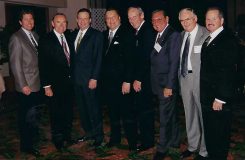
Brown chose Davis to serve as director of store operations administration after Davis had been a store manager for about a year.
After a couple of years in that role, Davis went back out into the stores. In 1985, Ralphs acquired the former Zody’s Department Store buildings, 14 stores averaging 100,000 s.f. of retail space. Davis and a “small but talented team,” as he describes them, helped develop a store format to operate within these large stores as well as hire and train the staffs to run them.
“In 1986, after successfully opening a $1-million-a-week prototype store in Bakersfield called the Giant, we proceeded to open one Giant store each week for 14 weeks in a row across Southern California,” Davis says.
While the Giant stores, now operating under the Ralphs banner, were eventually folded up, “the entrepreneurial experience and fast pace of all that we accomplished during those years stuck with me,” he says. That experience would be used at Bristol Farms in about a decade.
After his work on the Giant project, Davis was offered a job on the marketing side as director of sales and advertising, reporting to Al Marasca, who would later become president of Ralphs.
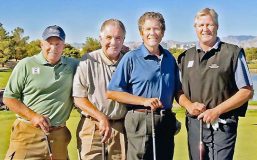
Brown couldn’t understand why Davis would want to leave store operations, telling him that he had planned to make him a VP on the operations side eventually.
But Davis saw the move to marketing as a way he could benefit his operations brethren: “I said, ‘Well, Jim, I’ve seen what marketing and advertising have done to the store operations guys over the years, and I think it’s about time we have a store operations guy running advertising.’”
Brown said, “Yeah, you’re probably right.”
So Brown “kind of anointed me to take that job,” Davis said. “Without his support I probably wouldn’t have gotten it. I was in advertising and marketing, but I never lost my store operations roots because of him and his great values and great work ethic. He was first one in and last one out of the office. Just a great, hard-working guy his whole career.”
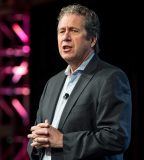
About a year after Ralphs was acquired by an investor—Ron Burkle’s Yucaipa Cos.—Davis resigned to become EVP of Bristol Farms, in May 1996. By July, he had been promoted to president by the Bristol Farms board. In February 1997, he was named chairman, president and CEO. In March 2015, EVP of Retail Adam Caldecott was named president and COO, with Davis continuing as chairman and CEO.
Davis has been very active in food industry associations during his career. He is a past Chairman of the California Grocers Association (CGA); president emeritus of the Western Association of Food Chains (WAFC); and past chairman of Unified Western Grocers (now Supervalu West). Currently, he is finishing out his term as chairman of the Food Marketing Institute. His two-year term began in January 2016.
Family’s important role
Kevin and his younger brother Kelly got to know their maternal grandparents when they were children, traveling from Los Angeles to Denver on an overnight train to visit them on school breaks. In the summer, they would go to the North Platte River and their grandfather would teach them to fly fish; in the winter, they would go to Winter Park and he would teach them to snow ski.
“We had the time of our lives. We thought all everybody in Denver did was get off the train and go fishing or skiing,” says Davis, who continues to enjoy those activities to this day.
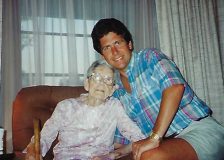
Davis’ grandfather had worked in his father-in-law’s grocery store during the Depression. An engineering student who had to drop out of college because of the Depression, he became a butcher. The couple came to own the store after her father died, and Davis’ grandfather worked there until they sold it.
“Years later, when we went to visit them in Wichita, we learned that they operated the grocery store from 8 to 5, then shut down at 6 for an hour for dinner and then went back to work next door, which was the beer bar of the neighborhood. Guys coming home from work would stop by, and my grandfather would go from butcher to bartender. They did so well that later in life they owned every house on that street.”
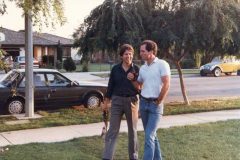
After he died, she had to sell her rental houses before moving to California to be near her daughter, Kevin’s mom, Beverly Brockmeyer.
Incidentally, Kevin lost his brother Kelly in October 2013 following an auto accident. Kelly, who had served as director of warehouse and distribution for Bristol Farms, was just a week shy of his 58th birthday.
Kevin and Cindy married on Nov. 14, 1981, and soon will celebrate their 36th anniversary.
They have seven kids—four girls and three boys—though neither of them had families as large as that growing up (four children in each of their families). Davis was named Father of the Year by the Los Angeles Times many years ago, and he said he told them he hoped it was for “quality, not quantity.”
All of them have “K” names, like their dad: Kerry, Kacie, Kristen, Kody, Karly, Kennedy and Kelli.
“They have just been wonderful…sometimes difficult, sometimes easy, but always fun. It makes for a fast life with all that going on,” Davis says. They had the kids in a 12-year span.
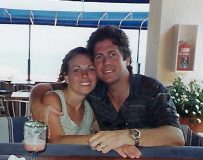
And all of them have worked in the business at one time or another.
“They’ve all had a taste of the grocery industry, which I think has given them some practical experience about what work means and about hard work and about the difficulty of sometimes sacrificing holidays and weekends and evenings to do the job because that’s when the business occurs. They’ve all learned that and they’ve all done great. We’re really proud of them.”
Kevin gives Cindy a lot of credit for her role in raising the kids.
“It wouldn’t all happen without Cindy. With the hectic schedule that I have, both in business and in the community, the association boards I serve on and everything that we’ve done, it just wouldn’t happen and you can’t have a family as big as we have, without having somebody at home,” he says. “So Cindy, when we had our first child, became a stay-at-home mom and took care of the kids over the last 25 years or so as they’ve been growing up and really done a fabulous job.”
Not only has she taken care of her family, she also has “a philanthropic streak,” he adds. “She really cares about kids and helping them.”
Cindy currently is chairman of Hope House in Anaheim, which is a charity that helps kids struggling with drug or alcohol addiction by way of a nonprofit halfway house. She’s been on the board there for many years and currently serves as chairman of that organization, he says.
“She gives to everybody every day and then she tries to find a way to give back. So I’m very fortunate to have had her support me throughout my career and make everything that I’ve done possible.”
In addition to taking care of the kids and Kevin, Cindy also took care of her grandmother who had Alzheimer’s for 14 years while the kids were young.
Both Cindy and the kids “are very passionate about giving back,” and their experience with Cindy’s grandmother led daughter Kelli to create an Alzheimer’s fundraiser at her high school and now at her college sorority.
“The kids were all instrumental and learned a lot from having that experience with their grandmother while they were growing up. We used to push around the wheelchair that she was in at Disneyland and on trips to Hawaii, everywhere we went.”
Giving back and passing the torch
“One of the things I think is really key, and when I get a chance I often talk about with the industry, is the opportunity to give back,” Davis says.
He learned it from not just Ralphs, where he worked, but from the entire Southern California food industry. Industry competitors “put down their swords” and come together to serve organizations like City of Hope (cancer and diabetes research and treatment); Olive Crest (helping at-risk kids through foster care and other services); CCEJ (California Conference for Equality and Justice, providing an option for probation officers, school counselors and clergy to refer troubled kids to, instead of sending them to jail); Boy Scouts of Orange County; and the Cystic Fibrosis Foundation, a cause the industry rallied behind largely because of Shelby Klug, daughter of industry executives Sue Klug and Todd Klug. (Shelby received a double-lung transplant about two years ago and now is cured, but she faced death prior to that time; Kevin Davis played a role in connecting the Klugs with the transplant doctor at UCLA Medical Center that would save Shelby’s life.)
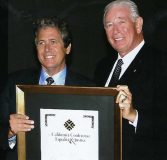
Competitors working together for the common good “is unique to the West Coast,” he says. “As chairman of FMI right now and in share groups with companies all over the country—they do not do this elsewhere. We might fight hard every day of the week as competitors and market against each other and build stores against each other and do everything we can to succeed, but we also know when to put down our swords and when to work together for the common good and for the communities we all serve. That’s been something that was created by our predecessors in our industry who had a lot of foresight, and I try to carry that torch to the next generation, to let them know how important that is for our communities and our industry. It puts our industry as a group in a much better light than it would if we each just did our own self-serving PR events.
“I’ve always wanted to be involved in philanthropy for both personal fulfillment as well as the way it serves our companies,” Davis says.
Outside the industry, he is a director and past chairman of the California Hospital Medical Center Foundation Board and has been involved with the hospital for 22 years. The downtown L.A. private hospital was started by nuns more than a century ago as part of their charity work, Davis says, and while there are hospitals closer to his home that he could be involved with, they get plenty of funding and “don’t need me as much.”
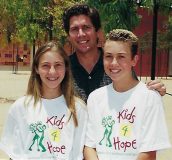
The nonprofit hospital, now part of the Dignity Health Foundation hospital chain, “more than any other serves the mission of the sisters”—helping the indigent, immigrants and “people that come from the tough part of L.A.,” he says. But with its downtown location, it also serves people who work in the high-rises and visitors to entertainment venues downtown.
“It is the trauma center for downtown Los Angeles…and they also have nearly the most births in Southern California of any hospital, second only to USC Medical Center County General Hospital.”
The board raises money for the hospital—the most in the Dignity Health chain—with events such as La Grande Affaire, a French-style dinner and fundraiser “that’s a very elaborate, fun event where we launch the Nouveau Beaujolais wine every year and have the first tasting of that. It’s a high-end, black-tie event that raises about half a million dollars a year for the hospital.”
Bristol Farms as a company also gives back in a variety of ways, including through the education of its team members. The company has many employees that take Retail Management Certificate courses. Davis himself, supported by full scholarships from the Western Association of Food Chains, graduated from the USC’s Food Industry Management (FIM) Program in 1978 and later graduated as class president of the Executive Program in the Graduate School of Business at UCLA. He was named Alumnus of the Year by the FIM Program in 1999 and Executive of the Year in 2011.
A time for play
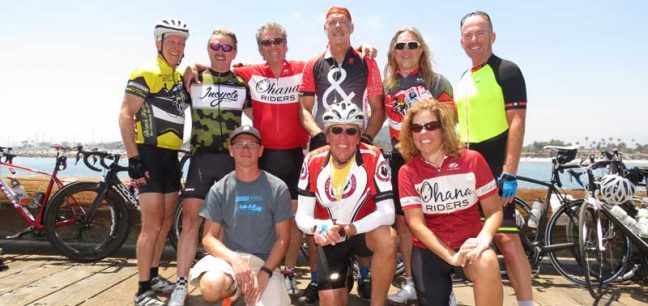
With a schedule as full as his, Davis has to make a concerted effort to participate in the activities he enjoys, which include fishing, skiing and biking.
“I enjoy everything, and I learned that, I think, from both my dad and my grandfathers, who were very, well diversified and kind of renaissance guys who did everything.”

Kevin’s father, who died when Kevin was fairly young “painted and was an engineer at Hughes. My grandfather was a rosarian who raised award-winning roses and yet was a great fisherman and hunter and a really smart guy. He taught me chess when I was eight years old and gave me about five books to read before he’d play me the first time. They were really students of life and art, and I think I have a streak of that. Because of that, I’ve always liked to keep really busy doing different things.”
He played basketball and tennis as a kid and learned to snow ski early on from his grandfather. He taught all his kids to ski, too, often taking them night-skiing even as preschoolers. They still do family ski trips today.

Though he has known how to ride a bike since he was a kid, he got into serious biking eight or nine years ago as a way to get exercise that wasn’t so tough on his knees. He started riding a lot, and the unique tan he developed from wearing his bicycle kit that he would show on the golf course got people asking him if he was a rider. That led to groups forming to take rides of 100 miles or more.

“We have a great time doing it; it’s very fun and social and healthy,” Davis says. “It’s tough to find the time to do it and to keep in shape. But I fully intend to keep that up and ride a lot more as my schedule permits.”
He was taught to fly fish as a young kid by his grandfather as well. Kevin inherited a lot of his gear when he passed away.
“It’s kind of an art, but it’s very relaxing on the river when you’re fishing,” he says. “You can’t hear anything but the water. You don’t hear phones ringing, there’s no other noise—just the silence of the forest and the water. We do a lot of catch-and-release of steelhead and other species of fish that are endangered.”
He often fishes with industry colleagues, locally as well as places like Alaska.
What’s ahead
Davis, in response to the question of what he sees ahead for the industry, said, “The industry has been changing for years, certainly during the 45 years I’ve been in it.
“It’s changed dramatically from when I was a box boy. Then, 98 percent of the food eaten at home was bought at traditional grocery stores. Today, that number is 48 percent, and the other 50 percent is at alternative channels, whether it’s Trader Joe’s or Whole Foods or Sprouts or Bristol or Lazy Acres or Smart & Final, dollar stores, CVS, Aldi, Lidl, all that. There are so many different channels of trade now, and now digital is just another one of those. Whether it’s home delivered by Amazon or one of those alternative channels, the evolution has already begun and it’s evolving. The stores that people shop for food—the methods, the channels they use to get food—are changing and they continue to change.”
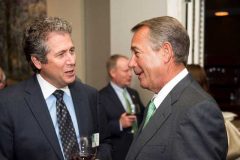
He sees online grocery shopping as still mainly the domain of commodity-type items—those that are the same no matter where they are purchased—and that is likely to continue. Home delivery is another topic that is constantly in the news but, again, the percentage of people who are looking for home delivery of groceries is likely to not be more than 20 percent at its height. Why? Partly because half of U.S. consumers have a household income under the average ($57,000) and don’t have the means to pay for delivery; also partly because many consumers don’t live in areas where home delivery is an option geographically.
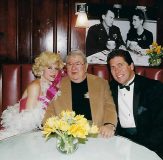
Bristol Farms and Lazy Acres offer delivery service, but “it’s very difficult to order fish of the day when you don’t know what it is, or you don’t believe it’s fresh unless you can smell it, or you want the butcher to cut you a steak of a certain thickness, or you just want to taste or smell the soup of the day at the café or the restaurant or the product people are demonstrating—foods that are highly oriented towards fresh and value-added products like Bristol Farms and Lazy Acres are focused on. We know that our ability to draw customers to our store is really based on our ability to merchandise and provide qualitative difference and points of difference to our customers that they can’t experience at every other store. That’s why I think alternative formats have been growing over the past 10 or 15 years at the expense of traditional grocers who haven’t had the same philosophy. So we feel the future is bright.”
Davis, at 64, is at a point in his career where there are some options.
“I could retire next year or the year after or any time, but I have a lot of passion and energy left and I think a lot of experience that I can help retailers with our own company or others,” he says, acknowledging that his great equity partners at Endeavour Capital eventually will want the money out of their investment. “When that happens, I’ll evaluate the opportunities either with Bristol Farms or in the industry to make a contribution as long as they feel that I can make one. I don’t want to quit doing what I love doing; I think at some level I will always have something to contribute to the industry. It’s been very good to me and helped me take care of my family of seven and build this chain from three stores to 23, with four under construction if you count Bristol Farms, Lazy Acres and Metropolitan Markets all together. We’re doing very well and continuing to grow.”
Editor’s note: The full special section honoring Bristol Farms and Kevin Davis can be seen in the December 2017 edition of The Shelby Report of the West.






